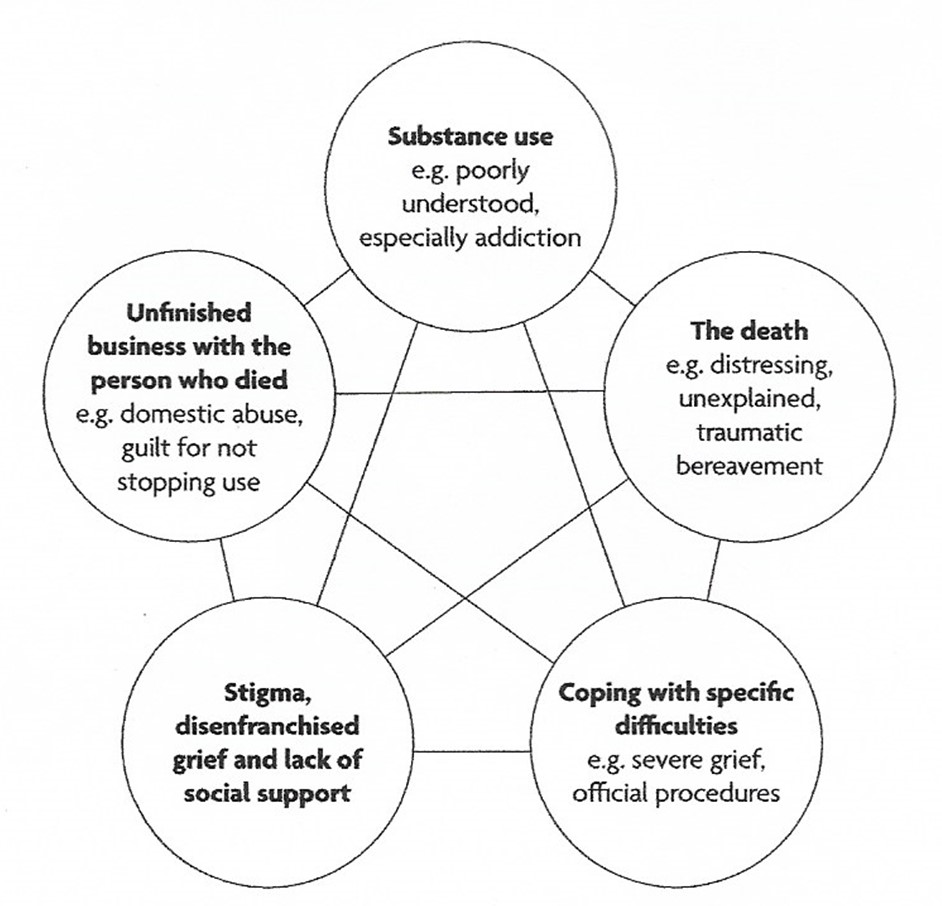This article has been written by bereavement counsellor and trainer Peter Cartwright, following publication of the ONS 2022 alcohol-specific deaths, showing another record high of 10,048 deaths due to alcohol in 2022.
Behind familiar reporting of the latest rise in alcohol-related deaths, lies the less well known story of the bereavements these deaths entail for those who have lost a loved-one this way. Recent research is revealing that, whilst alcohol- and drug-related bereavements vary a lot, they are often severe, complex and long-lasting (Valentine 2018, Cartwright 2019), and that they have five potential substance-related characteristics that are in addition to the characteristics found in all bereavements, that tend to create this severity, complexity and longgevity (Cartwright 2019).
The intensity of grief found in these bereavements is often unexpected and also easily overwhelms someone’s ability to cope. Similarly, intense grieving may endure far beyond someone’s expectation, and the death may even become their life’s defining experience, with their life before it and an unrecognisably changed life thereafter.
Unsurprisingly therefore, these bereaved people often need help to cope with and work through their grief. However, until recently very little specialist literature existed to inform and guide practitioners in how to work with these bereaved people. In 2020 the first book to address this matter was published by myself and twenty other authors (Cartwright 2020).
The book details these five potential substance-related additional characteristics. Briefly they are:
- Substance use. Grieving is significantly influenced by the substance(s) used and the associated behaviour; they affect how someone died; and also, often affected bereaved people’s relationship with the person who died. For example, someone dying of long-term healthy difficulties following many years of alcohol addiction, is very different to a young person who unexpectedly died of an overdose whilst experimenting with substances. Bereaved people often experienced substance use, especially when addictive, as confusing, frustrating and frightening, and they can often misunderstand or be poorly informed about it.
- Unfinished business associated with the person who died and their substance use. Substance-related bereavements usually include unfinished business from the relationship with the person before they died, i.e. difficult situations and events associated with substance use that were not satisfactorily resolved. Unfinished business occurs either from before the death, such as living with addictive use and associated behaviour, or only be apparent after the death, such as not having known about the substance use or how potentially fatal it was. Enduring guilt and/or blame are common emotions in unfinished business, whether these emotions are warranted or not.
- The death. The circumstances of substance-related deaths are often distressing and form a significant part of grieving. These deaths happen in many ways: anticipated after a long illness due to substance use, typical of the long-term complications of alcohol or intravenous drug use, or expected after previous overdoses or suicide attempts. Conversely, it may have been sudden and unexpected, sometimes also horrific, such as other suicide deaths, or a road traffic accident. Other deaths occur far away or after losing contact, so may seem unreal. For others, the circumstances may be no more significant than deaths through other causes.
- Stigma, disenfranchised grief and lack of social support. Substance-related deaths typically stigmatise the person who died and those who are bereaved, although not everyone experiences stigma. Also, there is often a continuation of stigma from before the death. This negatively affects bereavement and creates disenfranchised grief, that is a loss that is not socially sanctioned, openly acknowledged or publicly mourned (Doka 1989), and a subsequent loss of social support at a time it is typically most needed.
- Coping with specific difficulties. These often concern official procedures, such as an autopsy, inquest and possible media intrusion. Additional specific difficulties include those arising from the particular relationship with a loved-one who died, especially for fathers and even more so mothers, but is not limited to them; and how grieving is often unexpectedly severe, complex and long-lasting.
Each characteristic is a cluster of related experiences. Also, these characteristics are inter-connected and influence each other, see Figure 1. For example, a bereaved person who misunderstands addictive substance use is likely to have more unfinished business and find the death harder to understand, addictive use increases their risk of being stigmatised, and all these combine to produce an unexpectedly severe, complex and long-lasting bereavement.

Figure 1 – The five, interconnected, substance-related characteristics that potentially affect bereavement. (Cartwright 2020).
The model offers a way to make sense of someone’s grief. In addition, each of these five potential characteristics can be ‘reframed’ as needs, that support can help a bereaved person to meet. So, in the example above, support can meet the needs to understand addictive substance use, to work through unfinished business, to make sense of the death, to develop resilience against stigma, and to cope better with a difficult bereavement. The meeting of these many needs facilitates more effective grieving, and how this can happen is described in the book, along with many accounts and case studies of these bereavements.
Peter Cartwright
Further information about Peter Cartwright’s book, Supporting people bereaved through a substance-related death is available here.
To purchase Peter’s book visit this page: https://www.hachette.co.uk/titles/peter-cartwright-2/supporting-people-bereaved-through-a-drug-or-alcohol-related-death/9781784504632/
For information about Adfam’s range of bereavement training, delivered by Peter visit our Training page.
References
Cartwright, P. (2019). How helpful is counselling for people bereaved through a substance-related death?’ Bereavement Care 38, 1, 23–32.
Cartwright, P. (2020). Supporting people bereaved through a drug- or alcohol-related death. Jessica Kingsley Publishing.
Doka, K. (1989). Disenfranchised Grief: Recognizing Hidden Sorrow. Lexington, MA: Lexington Books.
Valentine, C. (ed) (2018). Families Bereaved by Alcohol or Drugs: Research on Experiences, Coping and Support. Routledge.
